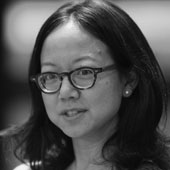
United Kingdom 2019

TMT | Citymapper



Alice Hou
TMT | Citymapper
Team size: 2
Major law firms used: Taylor Wessing
In early 2016, transport app Citymapper rose $40m of Series B financing from Index Ventures and Benchmark Capital, the latter a US venture capital firm which was one of the early backers of Uber. That money, alongside a $10m funding round in 2014, reportedly valued the company at more than £250m. Shortly after, Alice Hou joined as the tech start-up’s first GC. Hou, who trained at New York firm Hughes Hubbard & Reed, joined from publicly listed US marketing giant Sapient, where she was head of legal.
Citymapper was founded in 2011 by chief executive Azmat Yusuf, a former Google employee, and has grown from its London launch to provide urban navigation information in 39 cities, including Sydney, Hong Kong, San Francisco, Moscow and Paris. The company’s algorithm uses vast amounts of data to provide users with a multitude of transport options, including bus, train, metro and taxi, as well as presenting journey times and prices.
Hou, who has one other lawyer in her team, has helped launch a pop-up bus; a TfL-approved night bus route in Shoreditch; a shared taxi service in partnership with black-cab app Gett; and its own shared-ride service called Ride.
‘When you’re in-house, whether you’re a GC or just starting out, it’s like being a GP. You’re the first port of call – you have to find what’s potentially serious and then reassure everyone on the stuff that’s not serious,’ Hou comments. ‘And just like a good GP, a good in-house lawyer is able to distinguish one from the other and come up with solutions.’
She says the start-up has a constrained budget, meaning she often tries to build expertise in-house rather than relying on external firms. She cites GDPR as a recent piece of legislation she had to learn and implement in-house. She also wants to instil some of the lessons she learned in her decade at Sapient, which had 14,000 employees, into Citymapper as the company scales up. The notion of GCs providing strategic help is never truer than when a company is evolving, she says. ‘Our commercial model has evolved over time and we have a lot of discussion internally about how we should “improve this” or “solve this” or “make this bigger”. About 40% are those kinds of conversations; they’re not: “Do we need a new permit if we do this?”’
Taylor Wessing partner Adrian Rainey comments: ‘Like many of the leading tech GCs, she has to step into a whole variety of different issues, many of which can be challenging. She consistently demonstrates pragmatism when dealing with those issues.’